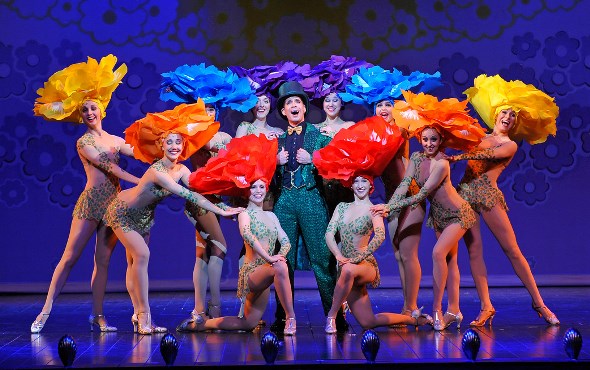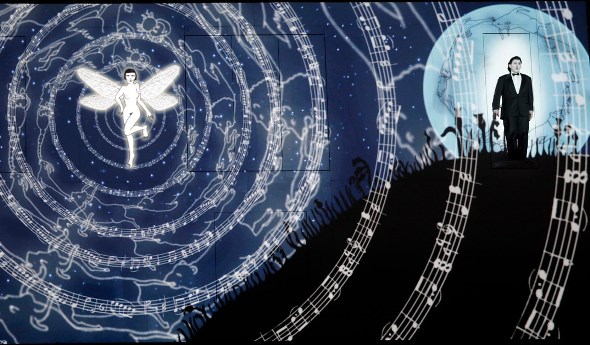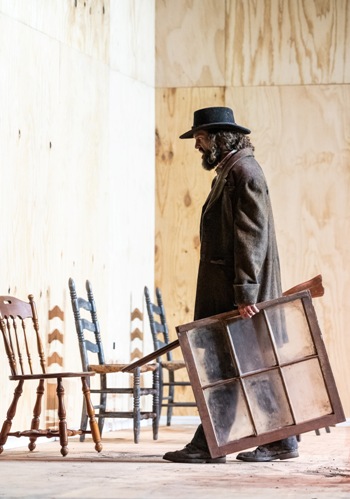Lyric drops curtain on entire 2020-21 season, projects return to opera house next September
Report: Eventual restart promises novel “Magic Flute,” Verdi’s “Macbeth,” new works by Terence Blanchard and Missy Mazzoli.
By Lawrence B. Johnson
Lyric Opera of Chicago’s lamentable, if not terribly surprising, announcement that it has canceled the entire remainder of its 2020-21 season comes with a poignant promise of renewed life much as we once knew it: detailed and quite enticing plans for 2021-22, a full season projected to start in the customary month of September.
Lyric joins the Metropolitan Opera in abandoning the fraught game of move-the-date in favor of declaring the current season wholly unworkable and moving on.

Terence Blanchard’s new opera “Fire Shut Up in My Bones” caps Lyric’s mainstage season. (Eric Woolsey/Opera Theatre St. Louis)
“We know our patrons are eager to reclaim their life and see opera again,” said Lyric general director Anthony Freud. “We are all looking for that light at the end of the tunnel. But what we’ve experienced is agonizing month-by-month hope. It seemed the most responsible course was to cancel the rest of the season to give ourselves breathing space, clarity and the opportunity to focus on creative programming.”
The new season will get underway with the conductor Enrique Mazzola’s first appearance as Lyric’s new music director, at the helm of Verdi’s “Macbeth” – a new production directed by David McVicar.
Mozart’s “The Magic Flute” returns to the Lyric stage in a widely acclaimed production inspired by the world of silent movies and directed by Barrie Kosky. The calling card of this off-beat “Magic Flute” is what Freud described as its “tremendous visual impact.”
The company presents its first Spanish-language opera in a mainstage season with Daniel Catán’s “Florencia en el Amazonas,” which takes its style from the magical realism of Gabriel Garcia Márquez.
Terence Blanchard’s “Fire Shut Up in My Bones,” which will open the Metropolitan Opera season, closes Lyric’s mainstage series. It is a joint production by the two companies.
Also on tap is a contemporary opera that was victimized in Lyric’s reshuffling of this season’s lineup: Missy Mazzoli’s “Proving Up,” which Freud called “a gripping, supernatural drama about the quest for the American dream.” Mazzoli is composer-in-residence with the Chicago Symphony Orchestra. As originally planned, Enrique Mazzola will conduct.
(Pushed to a later season in this reshuffling is “Blue,” a potent and timely collaboration by composer Jeanine Tesori and librettist Tazewell Thompson about a Black police officer whose son is shot and killed by a fellow officer. “Blue” was honored as Best Opera of the Year by the Music Critics Association of North America. Freud said the work would be prominent in Lyric’s future programming.)
The high-powered musical “42nd Street,” also wiped out in the virus cancellations, will be restored as the whipped cream atop Lyric’s 2021-22 opera season.

The musical “42nd Street” will provide a splashing epilogue to Lyric’s 2021-22 season. (Marie-Noëlle Robert/Théâtre du Châtelet)
“It’s hard to make plans in this environment,” Freud said, “but it’s my earnest hope that 11 months from now – a period longer than the one we’ve already been through – sufficient progress will have been made in fighting this disease that a vaccine will be in place and that we might even have effective medical treatment for it.”
Meanwhile, Lyric Opera, like so many other arts organizations, is hunkering down in survival mode.
“We’re working hard at fund-raising, and our board members have been very generous,” Freud said. “There have regrettably been staff furloughs and we’re in dialog with our union partners to restructure contracts. The recovery period ahead will be long and slow.”
Freud noted that Lyric is one of the few U.S. arts organizations that shoulder the financial burden – and risk – of owning its own performance, construction and administrative spaces in the building called the Lyric Opera House. The Chicago Symphony is another, along with the Metropolitan Opera, the New York City Ballet, the New York Philharmonic and the Boston Symphony Orchestra.
That ownership, and the extensive staffing that goes with it, has worked to the disadvantage of both the Lyric and the Chicago Symphony in their quest for federal pandemic relief,” Freud said.
“Neither the San Francisco Symphony nor the San Francisco Opera own their performing spaces,” he said. “Consequently, their full-time staffing was small enough to allow them to qualify for relief, which for the two organizations amounted to between $12 million and $15 million – while Chicago received zero.”

Aisle end-panels, removed along with the old seats at the Lyric Opera House, will be reinstalled along with new seats arrayed to improve patrons’ comfort and sightlines. (Lyric Opera of Chicago)
While the stage is dark, Lyric is pushing ahead with a major project to replace its 3,500 seats – indeed, to reduce that number by about 300 and improve sightlines throughout the house.
And at the same time it is enhancing the traditional opera-going experience, the company is “pushing an aggressive program” of virtual delivery of opera as well as other new ways of presenting the art form that Freud characterized as “inventive and experimental.” He insisted that online opera will not end when the pandemic is behind us.
“I believe the demand for virtual opera will continue even after we’re all back in the opera house,” he said. “My hope is that we all get better at it. Virtual offers a really creative opportunity to invent art that can only exist virtually.
“But of course we all look forward to recapturing the irreplaceable thrill of the live experience. Lyric will be back. Great opera will be back.”



